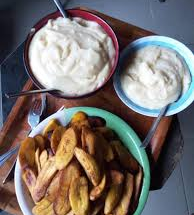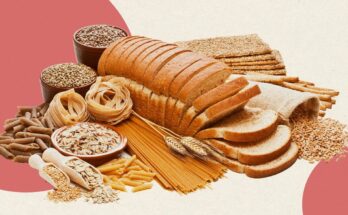Plant-Based Diets: Benefits and Easy Recipes
Introduction
Have you ever pondered the reasons for the widespread adoption of plant-based diets? It’s a lifestyle shift that has many advantages for your health, the environment, and even your pocket—it’s not just a trend. We’ll delve further into the realm of plant-based diets in this post, examining their advantages and offering some simple yet delectable recipes to get you started. This guide is for anyone interested in increasing their intake of plant-based foods, regardless of their level of experience with veganism.
What is a Plant-Based Diet?
A plant-based diet focuses on foods primarily from plants. This includes not only fruits and vegetables but also nuts, seeds, oils, whole grains, legumes, and beans. It doesn’t mean that you are vegetarian or vegan and never eat meat or dairy. Rather, you are proportionately choosing more of your foods from plant sources.
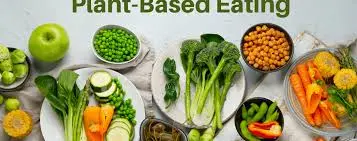
Benefits of a Plant-Based Diet
1. Improved Heart Health
One of the most significant benefits of a plant-based diet is improved heart health. Studies have shown that plant-based diets can lower blood pressure, reduce cholesterol levels, and decrease the risk of heart disease.
2. Weight Management
Switching to a plant-based diet can help with weight management. Plant-based foods are generally lower in calories and higher in fiber, which can help you feel full longer and reduce overall calorie intake.
3. Better Digestion
High in fiber, plant-based diets promote better digestion and can help prevent constipation and other digestive issues.
4. Reduced Risk of Chronic Diseases
A diet rich in fruits, vegetables, and whole grains can reduce the risk of chronic diseases such as diabetes, cancer, and Alzheimer’s.
5. Environmental Benefits
Plant-based diets are more sustainable and have a lower environmental impact compared to diets heavy in animal products. They require fewer resources like water and land and produce fewer greenhouse gases.
Getting Started with a Plant-Based Diet
1. Start Slow
You don’t have to go all-in overnight. Start by incorporating one plant-based meal a day and gradually increase from there.
2. Educate Yourself
Learn about the nutritional aspects of a plant-based diet to ensure you’re getting all the necessary nutrients. Consider consulting with a nutritionist.
3. Experiment with Recipes
Try new recipes and find plant-based versions of your favorite meals. There are plenty of resources online to help you get started.
Easy Plant-Based Recipes
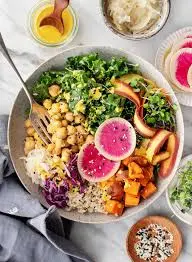
1. Breakfast: Overnight Oats
Ingredients:
- 1 cup rolled oats
- 1 cup almond milk
- 1 tbsp chia seeds
- 1 banana, sliced
- 1 tbsp maple syrup
Instructions:
- Combine all ingredients in a jar.
- Stir well and refrigerate overnight.
- Enjoy in the morning with your favorite toppings.
2. Lunch: Quinoa Salad
Ingredients:
- 1 cup cooked quinoa
- 1 cup cherry tomatoes, halved
- 1 cucumber, diced
- 1/4 cup red onion, chopped
- 1/4 cup fresh parsley, chopped
- 2 tbsp olive oil
- 1 tbsp lemon juice
- Salt and pepper to taste
Instructions:
- Combine all ingredients in a large bowl.
- Toss well to mix.
- Serve chilled.
3. Dinner: Chickpea Curry
Ingredients:
- 1 can chickpeas, drained and rinsed
- 1 can coconut milk
- 1 onion, chopped
- 2 garlic cloves, minced
- 1 tbsp curry powder
- 1 tsp cumin
- 1 tsp turmeric
- Salt and pepper to taste
- Fresh cilantro for garnish
Instructions:
- Sauté onion and garlic in a large pot until translucent.
- Add spices and cook for another minute.
- Stir in chickpeas and coconut milk.
- Simmer for 20 minutes.
- Garnish with fresh cilantro and serve with rice.
4. Snack: Hummus and Veggies
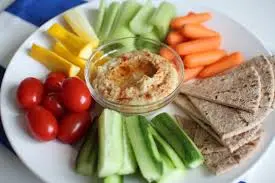
Ingredients:
- 1 can chickpeas, drained and rinsed
- 1/4 cup tahini
- 1/4 cup lemon juice
- 2 garlic cloves, minced
- 2 tbsp olive oil
- Salt to taste
- Assorted fresh veggies for dipping
Instructions:
- Blend all ingredients in a food processor until smooth.
- Serve with fresh veggies.
Tips for Maintaining a Plant-Based Diet
1. Plan Your Meals
Planning your meals ahead of time can help you stick to a plant-based diet and avoid the temptation of unhealthy options.
2. Keep Healthy Snacks on Hand
Having healthy snacks like nuts, fruits, and veggies readily available can help you stay on track.
3. Stay Hydrated
Drinking plenty of water is essential for overall health and can help you feel full and satisfied.
4. Find a Support System
Join a community of like-minded individuals who can offer support and share tips and recipes.
Common Misconceptions About Plant-Based Diets
1. Lack of Protein
Many people believe that plant-based diets lack sufficient protein. However, there are plenty of plant-based protein sources such as beans, lentils, tofu, and quinoa.
2. Expensive
While some specialty plant-based products can be pricey, a plant-based diet can be affordable by focusing on whole foods like grains, beans, and seasonal produce.
3. Limited Food Choices
A plant-based diet offers a wide variety of foods and flavors. With a bit of creativity, you can enjoy diverse and delicious meals.
Read This: Strength Training for Beginners: Your First Workout Plan
Conclusion
Switching to a plant-based diet can be a rewarding experience with numerous benefits for your health and the environment. By starting slow, educating yourself, and experimenting with recipes, you can make the transition smoothly. Remember, it’s not about perfection but progress. Enjoy the journey and the delicious, nutritious meals along the way.
FAQs
1. Can I get enough protein on a plant-based diet? Yes, there are plenty of plant-based protein sources such as beans, lentils, tofu, and quinoa.
2. Is a plant-based diet expensive? It can be affordable by focusing on whole foods like grains, beans, and seasonal produce.
3. Can I lose weight on a plant-based diet? Yes, plant-based diets are generally lower in calories and higher in fiber, which can help with weight management.
4. Do I need to take supplements on a plant-based diet? It’s essential to ensure you’re getting all necessary nutrients. Some people may need supplements for vitamins like B12 and D.
5. Are plant-based diets suitable for children? Yes, with proper planning, children can thrive on a plant-based diet. It’s important to ensure they get all necessary nutrients for growth and development.
Meta Description
Discover the benefits of plant-based diets and explore easy, delicious recipes to get you started. Learn how to transition smoothly and enjoy a healthier lifestyle.
